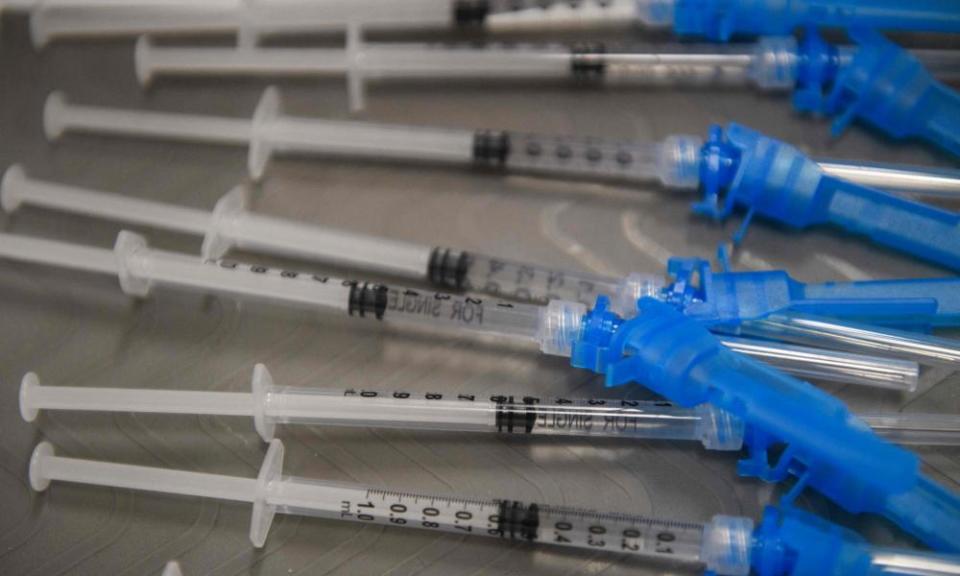Authorities investigate death of NSW woman who developed blood clots after Covid vaccination

Australia’s medicines regulator and the NSW health department are investigating the death of a 48-year-old diabetic woman who developed blood clots after receiving a coronavirus vaccine.
The woman, from Lake Macquarie on the NSW Central Coast, received the vaccine last Friday and developed blood clots the next day before being placed on dialysis. She died on Wednesday.
The ABC reported on Thursday night initial tests did not show a conclusive link between her condition and the vaccine but the Therapeutic Goods Administration is investigating whether it could have been linked.
Prof Catherine Bennett, the chair of epidemiology at Deakin University, told Guardian Australia “it would be unusual for the [clot] symptoms to develop so quickly after the vaccination”.
Related: Mass Covid vaccination clinics pointless in Australia without greater supply, doctors say
The federal health department said the TGA and NSW Health were investigating the death.
“As part of this process the TGA is seeking further clinical information including clinical test results from the NSW health department,” the federal department said in a statement. “It has not yet been established whether there is any link between the Covid-19 vaccine and the tragic death.”
It has not been confirmed if the woman received the AstraZeneca vaccine which has so far been linked to two cases of extremely rare blood clotting in Australia.
The federal government last week announced the Pfizer vaccine was now preferred for anyone under 50. Australia’s independent expert advisory panel on vaccines pointed to a small but potentially increased risk of developing a rare and severe clotting disorder following the AstraZeneca vaccine being administered in those under 50.
But experts cautioned it was possible the 48-year-old’s death was not linked to the vaccine.
“We now know there is an association with very rare side effects but it’s a very particular type of clotting,” Bennett said.
“Clotting generally is actually quite common and we have something like 17,000 cases a year. But these ones we’ve seen with some of the AstraZeneca recipients are clots we usually only see one in a million.”
Watch: Should I be worried about the AstraZeneca Covid-19 vaccine?
Bennett said the reported timeline would have meant the woman developed the clots unusually quickly. She also said it was notable the head of the TGA, Prof John Skerritt, had not mentioned the case during public comments this week.
Skerritt told reporters on Tuesday the TGA had received “a very large number” of reports of clotting but none that “looked highly suspicious”.
“It’s something that they can diagnose quite quickly – it’s not a condition where they would be saying ‘Well we just don’t know’ – so I would say stay calm and wait to hear what the TGA says,” Bennett said on Thursday night.
“It would be unusual for the symptoms to develop so quickly after the vaccination and I do think we probably would have heard about it earlier in the week. People should rest assured they will look at it very, very closely to see whether the vaccine contributed. At this stage, it’s not sounding like, it but we just don’t know yet.”
The federal health department on Thursday night said the blood clotting disorders being investigated in connection with the AstraZeneca vaccine were “very rare and differ from common blood clots or venous thromboembolism which occur in around 50 Australians every day”.
“The clotting disorder being investigated in connection with the AstraZeneca Covid-19 vaccine, which is now referred to as ‘thrombosis with thrombocytopenia syndrome’ (TTS), has been confirmed in only two cases out of over 700,000 people who have received the AstraZeneca vaccine in Australia.”
NSW Health said “the death of anyone is always a tragedy and our condolences are with the family and loved ones of the person who has passed away”.
“A conclusion regarding a causal relationship with the vaccine is not necessary to suspect or report an adverse event. NSW Health is notified when a serious or unexpected adverse event occurs,” a spokesperson said.
“NSW Health investigates these events and refers its expert panel findings to the TGA, which is responsible for assessing causality. Many conditions can arise during normal life, whether or not a vaccine is administered, but it remains important to report any new serious or unexpected events so that safety can be appropriately monitored.”
Related: ‘Prepare for the worst’: Australian Olympians await Covid-19 vaccine
Earlier this week, the TGA said a second case of a rare blood clot syndrome in Australia was “likely” linked to the AstraZeneca vaccine. The case came after a 44-year old Melbourne man also developed the syndrome earlier in April.
Skerritt said at the time the second woman’s diagnosis was “complicated by some other conditions” and the risk of developing side effects remained extremely rare.
Health authorities estimate the syndrome affects four to six cases per 1m AstraZeneca vaccine recipients, but it can cause a death rate of up to 25% when it occurs. The Australian Technical Advisory Group on Immunisation, an independent group of medical experts that advises the health minister, said: “More cases can be expected to occur, albeit rarely.”
Watch: Coronavirus peaks examined across the UK

 Yahoo Movies
Yahoo Movies 